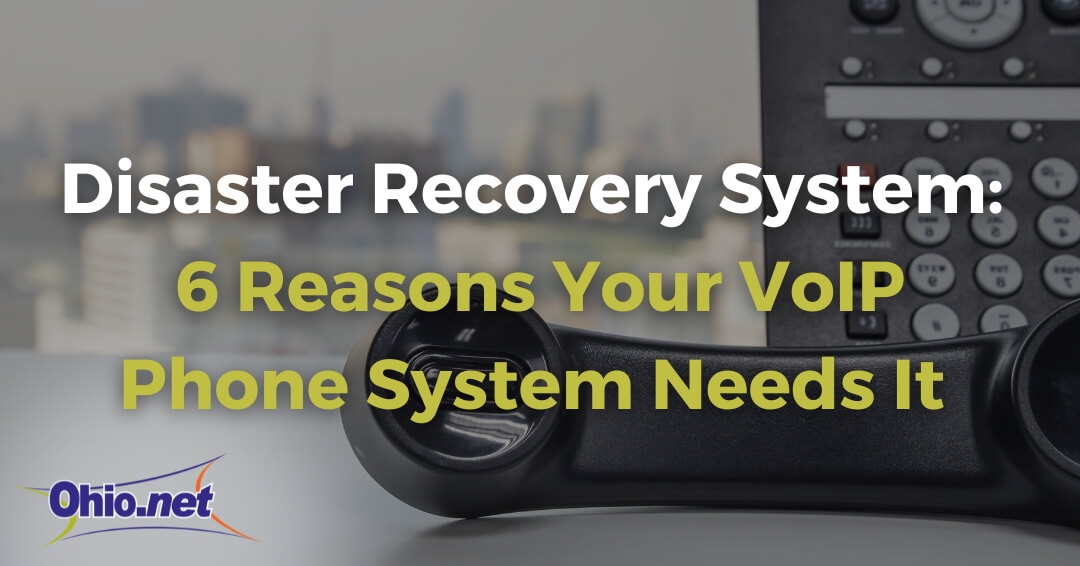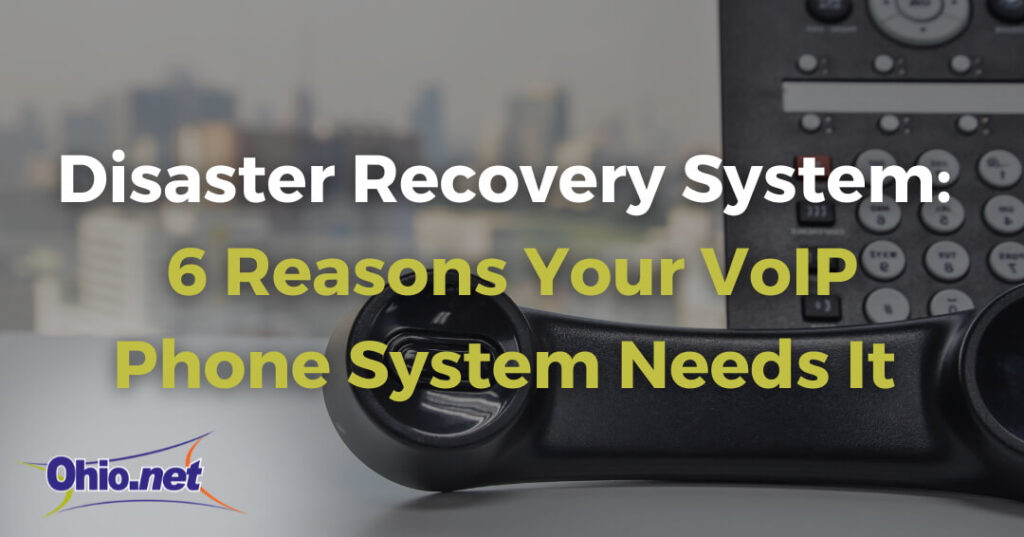
Every business should have a disaster recovery solution or continuity plan, especially to ensure the continuation of its communications. Most businesses could not operate without communication channels like email, telephone, faxing, and voice mail.
The following are six critical reasons you need a disaster recovery plan for your VoIP system:
- Today, voice is really considered data/information. From 911 calls to teleconferences, there is a need to keep copies of calls and other information, like call time and duration.
- A VoIP phone system comes with more advanced recovery features than a traditional public switched telephone network (PSTN) system. So, why not implement them? It’s better to put a plan in place and practice disaster avoidance, than to wait to recover.
- There are industry-specific data retention polices. Long before 9/11 and Enron, industry-specific needs called for data retention policies. For example, law firms and accounting practices are required to hold onto data for a specified period of time for normal operations or to deal with reoccurring problems. Now voice data can hold the same importance.
- There are federal, state, and local data and voice security requirements. With VoIP, it’s easier to capture and retain data.
- A VoIP phone system can be susceptible to the same threats as other information systems. Although VoIP comes with a host of robust features, because it travels via the Internet, it can face some of the same threats as your data network.
- More metadata is available with a VoIP phone system and that metadata is very useful for marketing purposes, business trends, costs, and legal forensic research. Providing backup and recovery for your VoIP system not only ensures continuity of your voice traffic but can also prevent against loss of your voice metadata (information about the calls like duration and date).
Understanding the Risks of VoIP System Failure
VoIP system failure can have severe consequences for businesses, including loss of productivity, revenue, and customer trust. Understanding these risks is crucial for developing an effective disaster recovery plan. Here are some common risks associated with VoIP system failure:
- Network Outages: VoIP systems rely on internet protocol (IP) to function, making them vulnerable to network outages. A disruption in your internet service can bring your entire communication system to a halt.
- Power Outages: VoIP systems require power to operate. In the event of a power outage, your VoIP phones and other related equipment can fail, leading to a complete breakdown in communication.
- Cyberattacks: VoIP systems can be targets for cyberattacks, such as hacking and malware. These attacks can compromise your voice communication and lead to data breaches.
- Natural Disasters: Events like hurricanes, earthquakes, and floods can cause physical damage to your VoIP systems and infrastructure, leading to prolonged downtime.
- Human Error: Mistakes such as misconfiguration or accidental deletion of critical files can also cause VoIP system failure. Human error remains one of the most common causes of system downtime.
By recognizing these risks, businesses can better prepare and implement a disaster recovery plan to ensure the continuous operation of their VoIP systems.
The Importance of a Disaster Recovery Plan
A disaster recovery plan is essential for businesses that rely on VoIP systems for communication. It helps ensure business continuity in the event of a VoIP system failure by providing a clear roadmap for restoring communication services. Here’s what a comprehensive disaster recovery plan should include:
- Risk Assessment: Identify potential risks and threats to the VoIP system. This involves understanding the specific vulnerabilities of your VoIP network and the likelihood of different types of failures.
- Business Impact Analysis: Assess the impact of a VoIP system failure on business operations. Determine which functions are critical and how long your business can operate without them.
- Recovery Strategies: Develop strategies for recovering from a VoIP system failure. This includes backup and restore procedures, as well as alternative communication methods.
- Testing and Training: Regularly test the disaster recovery plan to ensure it works as intended. Provide training to employees on how to implement the plan during an actual disaster.
Having a well-thought-out disaster recovery plan in place not only safeguards your VoIP system but also ensures that your business operations can continue with minimal disruption.
Key Features of a VoIP Disaster Recovery System
A robust VoIP disaster recovery system should have the following key features to ensure seamless business continuity:
- Automatic Failover: The ability to automatically switch to a backup system in the event of a failure. This ensures that your communication services remain uninterrupted.
- Redundancy: Duplicate systems and infrastructure to ensure continued operation in the event of a failure. Redundancy can include backup servers, alternative internet service providers, and additional power sources.
- Scalability: The ability to quickly scale up or down to meet changing business needs. A scalable system can adapt to increased call volumes or expanded operations without compromising performance.
- Security: Robust security measures to protect against cyberattacks and data breaches. This includes encryption, firewalls, and regular security audits.
- Monitoring and Reporting: Real-time monitoring and reporting to identify and respond to issues quickly. Continuous monitoring helps in early detection of potential problems, allowing for prompt corrective action.
These features are critical for a VoIP disaster recovery system to effectively protect your business from communication disruptions.
Implementing a VoIP Disaster Recovery System
Implementing a VoIP disaster recovery system requires careful planning and execution. Follow these steps to ensure a successful implementation:
- Conduct a Risk Assessment and Business Impact Analysis: Identify potential risks and assess their impact on your business operations. This will help you prioritize which areas need the most attention.
- Develop a Disaster Recovery Plan and Recovery Strategies: Create a detailed plan that outlines how to recover from a VoIP system failure. Include specific recovery strategies, such as backup procedures and alternative communication methods.
- Implement Automatic Failover and Redundancy Measures: Set up systems that can automatically switch to backups in case of failure. Ensure that you have redundant infrastructure to support continuous operation.
- Test the Disaster Recovery Plan and Provide Training to Employees: Regularly test your disaster recovery plan to ensure it works as expected. Train your employees on how to execute the plan during an actual disaster.
- Continuously Monitor and Update the Disaster Recovery Plan: Keep your disaster recovery plan up to date with the latest technologies and best practices. Regularly review and revise the plan to address new risks and changes in your business environment.
By following these steps, you can implement a VoIP disaster recovery system that effectively protects your business from communication disruptions.
Benefits of a Disaster Recovery System for Business Continuity
A disaster recovery system for VoIP provides numerous benefits for business continuity, ensuring that your operations can continue smoothly even in the face of disruptions. Here are some key benefits:
- Reduced Downtime: Quickly restore communication services in the event of a failure, minimizing the impact on your business operations.
- Improved Productivity: By ensuring that your VoIP system is always operational, you can maintain high levels of productivity and avoid costly interruptions.
- Enhanced Customer Satisfaction: Ensure continued communication with customers and clients, which is crucial for maintaining trust and satisfaction.
- Cost Savings: Reduce the financial impact of a VoIP system failure by minimizing downtime and avoiding potential revenue losses.
- Competitive Advantage: Demonstrate a commitment to business continuity and disaster recovery to customers and partners, giving you a competitive edge in the market.
Investing in a disaster recovery system for your VoIP network not only protects your business but also enhances its resilience and reputation.
As with any new technology, or change in technology, there are certain precautions you should take. Even with all the great functionality that comes with VoIP, there are potential threats and you should plan accordingly. Incorporating a VoIP disaster recovery plan and continuity of operations for your VoIP phone system, along with your IT systems, will keep your business and voice data safe.
If you have questions regarding your disaster recovery system and continuity plans, feel free to call us at 888-881-0805.


